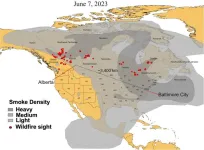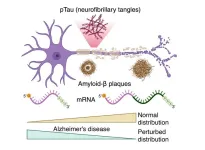(Press-News.org) Led by researchers from the University of Oxford’s Leverhulme Centre for Demographic Science and the University of Iceland, the review explores how genetic variations can explain differences in reproductive health and longevity.
The study provides the most comprehensive review of male and female genetic discoveries of reproductive traits to date, and provides new insights into how our DNA affects when we have children, the timing of menopause, and even how that is connected to how long we live.
Genes at the heart of reproduction
Using the GWAS Catalog, an online database of Genome Wide Association Studies (GWAS), the researchers identified 159 genetic studies and 37 key genes that are linked to reproductive traits such as age at first childbirth, menopause timing, and hormones such as follicle-stimulating hormone (FSH) and testosterone. These findings suggest that genetic factors play a significant role in broader health outcomes as well as influencing fertility.
One gene in particular, FSHB (follicle-stimulating hormone subunit beta), was found to be associated with eleven different reproductive outcomes. This gene helps regulate when menstruation begins and when menopause occurs, highlighting its role in reproductive health and ageing. The review also revealed connections between these reproductive genes and rare genetic disorders, showcasing how DNA impacts both fertility and overall health.
Senior lead author Professor Melinda Mills, Director of the Leverhulme Centre for Demographic Science and Oxford Population Health’s Demographic Science Unit said ‘As more people delay parenthood to later ages, it is important to understand the genetic factors underpinning an individual’s reproductive health and fertility window. Our study brings together research on the genetics of reproduction to reveal common genes across traits and insights beyond fertility that are inherently linked to health, body mass index (BMI) and obesity, hormone sensitive cancers, and even psychiatric and behavioural traits.’
First author Dr Stefanía Benónísdóttir, Postdoctoral Researcher at the Leverhulme Centre for Demographic Science and University of Iceland, said ‘By consolidating this research, we offer a clearer picture of how genetic factors shape reproductive health. This is essential for advancing healthcare, especially when it comes to infertility and reproductive ageing.’
Longevity, cancer, obesity risk and reproductive traits
The review explored the connections between reproductive genes and longevity, finding that genes like ESR1 (estrogen receptor 1) are linked to reproductive traits as well as to cancer risk. For example, starting puberty earlier or experiencing later menopause may increase the risk of hormone-sensitive cancers like breast cancer, but these same traits are associated with a longer lifespan. The FTO (fat mass and obesity associated) gene – previously found to have strong associations with BMI, obesity risk and type 2 diabetes – was also linked to multiple different reproductive traits. Understanding these genetic links is critical as more people choose to delay having children, making reproductive health and ageing even more intertwined.
Male fertility
While previous research has focused on female reproductive health, the study reviews what is known about the genetics of male fertility. Genes like DNAH2 are shown to play a role in both testosterone levels and sperm function, making it crucial for male reproductive health.
Co-author Vincent Straub, DPhil student at the Leverhulme Centre for Demographic Science and Oxford Population Health, said ‘Male reproductive health is critical to overall fertility but often under-researched. By exploring the genetics of male infertility, we can uncover new insights and potential treatments for those struggling with reproductive challenges.’
Genetics across generations
The review examined how genetic changes affect future generations. As parents age, they accumulate de novo mutations – new, spontaneous genetic changes that can be passed to their children. These mutations can have significant effects on the health and development of offspring, previously discovered by senior co-author Professor Augustine Kong.
This comprehensive review offers crucial insights into how our genes shape reproductive health, fertility, and longevity, providing a foundation for more personalised healthcare approaches that could improve outcomes for individuals and families across generations.
Editor’s notes
The full paper, ‘Genetics of female and male reproductive traits and their relationship with health, longevity and consequences for offspring’, is under embargo until 16:00 London time (11:00 US Eastern Time) on Friday 13 December 2024 and will be published in Nature Aging at https://www.nature.com/articles/s43587-024-00733-w (https://doi.org/10.1038/s43587-024-00733-w)
For more information, interviews and a copy of the paper under embargo, please contact the senior lead author Professor Melinda Mills (melinda.mills@demography.ox.ac.uk) and the communications team (LCDS.Media@demography.ox.ac.uk).
About the University of Oxford’s Leverhulme Centre for Demographic Science
Based at Oxford Population Health, the Leverhulme Centre for Demographic Science and Demographic Science Unit are at the forefront of demographic research, disrupting and realigning demography for the benefit of populations around the world. Focussing on inequality, family, biosocial, digital, geospatial, and computational research, our researchers use new types of data, methods and unconventional approaches to tackle the most challenging demographic and population problems of our time.
END
The genetic basis of fertility, family and longevity
2024-12-13
ELSE PRESS RELEASES FROM THIS DATE:
Exposure to remote wildfire smoke drifting across the US linked to increased medical visits for heart and lung problems
2024-12-13
Wildfire smoke has long been known to exacerbate health problems like heart disease, lung conditions, and asthma, but now a new study finds that smoke from these fires can lead to poor health thousands of miles away. Researchers from the University of Maryland Institute for Health Computing (UM-IHC) found that medical visits for heart and lung problems rose by nearly 20 percent during six days in June, 2023, when smoke from Western Canadian wildfires drifted across the country, leading to very poor air quality days in Baltimore and ...
Northwestern University joins Giant Magellan Telescope International Consortium
2024-12-13
PASADENA, CA – December 13, 2024 – The Giant Magellan Telescope announced today that Northwestern University has joined its international consortium to construct the $2.54 billion observatory.
Home to the world-renowned Center for Interdisciplinary Exploration and Research in Astrophysics (CIERA) and the newly founded NSF-Simons AI Institute for the Sky (SkAI), Northwestern is at the forefront of advancing astrophysical research. Northwestern researchers will develop and apply cutting-edge artificial intelligence ...
HR-positive, HER2-negative breast cancer patients with high risk of recurrence may benefit from addition of anthracyclines to taxane- based chemotherapy
2024-12-13
SAN ANTONIO – Patients with early-stage, node-negative, hormone receptor (HR)-positive, HER2- negative breast cancer who have a high risk of recurrence based on the OncotypeDX genomic test had better outcomes when treated with adjuvant anthracycline- plus taxane-based chemotherapy regimens compared with those receiving adjuvant taxane-based chemotherapy regimens alone, according to results presented at the San Antonio Breast Cancer Symposium (SABCS), held December 10-13, 2024.
“HR-positive, HER2-negative is the most common type of breast cancer in the United States and we frequently need to decide whether or not adjuvant chemotherapy ...
ZEST trial offers insights for using ctDNA to predict breast cancer recurrence
2024-12-13
SAN ANTONIO – The ZEST clinical trial, designed to evaluate niraparib (Zejula) for the prevention of breast cancer recurrence in patients with circulating tumor DNA (ctDNA), failed to accrue enough patients positive for ctDNA, according to results presented at the San Antonio Breast Cancer Symposium (SABCS), held December 10-13, 2024.
As some of the lessons learned from this trial, investigators suggest beginning ctDNA testing during treatment rather than waiting for treatment completion as done in ZEST, and including patients with high- risk ...
Multimodal machine learning model effective at predicting response to CDK4/6 inhibitors in HR-positive, HER2-negative breast cancer patients
2024-12-13
SAN ANTONIO – A machine learning (ML) model incorporating both clinical and genomic factors outperformed models based solely on either clinical or genomic data in predicting which patients with hormone receptor (HR)-positive, HER2-negative metastatic breast cancer would have better outcomes from adding CDK4/6 inhibitors to endocrine therapy as first-line treatment, according to results presented at the San Antonio Breast Cancer Symposium (SABCS), held December 10-13, 2024.
While the use of CDK4/6 inhibitors combined with endocrine therapy have significantly improved outcomes in patients with HR-positive, ...
Light-induced gene therapy disables cancer cells’ energy center
2024-12-13
COLUMBUS, Ohio – Researchers are shining a light on cancer cells’ energy centers – literally – to damage these power sources and trigger widespread cancer cell death.
In a new study, scientists combined strategies to deliver energy-disrupting gene therapy using nanoparticles manufactured to zero in only on cancer cells. Experiments showed the targeted therapy is effective at shrinking glioblastoma brain tumors and aggressive breast cancer tumors in mice.
The research team overcame a significant challenge to break ...
MLB adds lifesavers to the chain of survival at annual Winter Meetings
2024-12-13
DALLAS, December 13, 2024 — The American Heart Association and Major League Baseball (MLB) brought cardiopulmonary resuscitation (CPR) and automated external defibrillator (AED) training to the League’s annual Winter Meetings held in Dallas this week. Attendees from all 30 Major League Clubs and many organizations across the baseball industry learned lifesaving skills needed to respond confidently and capably in the event of a cardiac emergency.
According to American Heart Association data, 9 out of ...
TTUHSC researcher to study protein regulation in Alzheimer’s disease
2024-12-13
More than six million Americans are affected by Alzheimer’s disease, a form of dementia marked by accumulation of amyloid-β within the brain. Amyloid-β is a relatively small protein that forms toxic plaques in the brain contributing to the harmful effects of Alzheimer's disease. Another protein, hyperphosphorylated tau (pTau), also accumulates as toxic neurofibrillary tangles. Together, amyloid-β plaques and pTau tangles result in brain damage, neuroinflammation and ultimately brain death.
Gene expression studies have already identified ...
Oxidation in glacial rivers and lakes could help mitigate methane emissions
2024-12-13
(Carlisle, Pa.) — A new study in the journal Scientific Reports offers a rare glimmer of hope in the face of climate change, suggesting glacial rivers and lakes may play a crucial role in mitigating the effects of methane, a powerful greenhouse gas that recent studies have shown emerging as glaciers melt in warming global temperatures.
This new study, led by Dickinson College Associate Professor of Environmental Studies Kristin Strock, looked at what happens when glaciers melt and release trapped methane, a potent greenhouse gas that contributes to climate change. Strock, a 2019 National Geographic Explorer, led an all-female team of researchers ...
How chemical reactions deplete nutrients in plant-based drinks
2024-12-13
Over the last decade, the global market for plant-based beverages has seen remarkable growth, with oat, almond, soy and rice drinks emerging as popular alternatives to cow’s milk in coffee and oatmeal during this time.
One of the likely reasons for millions of liters of plant-based drinks ending up in the shopping baskets of consumers is that their climate footprint is often lower than that of cow’s milk. But consumers would be mistaken if they considered plant-based beverages healthier than cow’s milk. This is highlighted in a new study conducted by the University of Copenhagen in collaboration with the University ...



